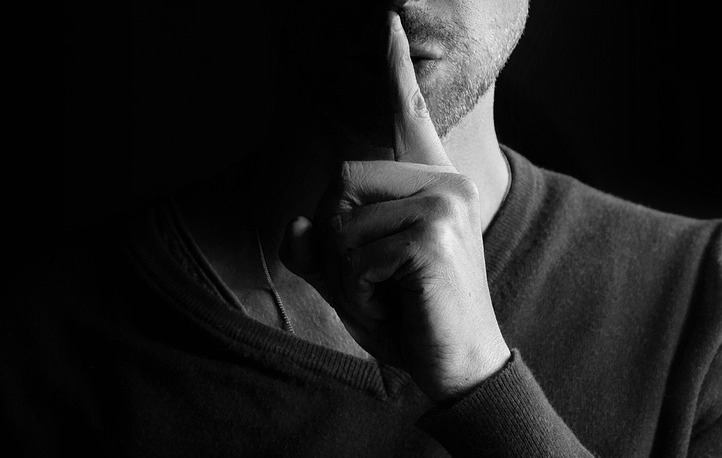


When a Minister was arrested last year, how far should that have been reported? That's the question Advocate Olaf Blakeley turns to in his latest column...
In a previous edition, I wrote about your right to freedom of expression. My article followed an explosion of commentary on social media about the circulation of a newspaper-style publication called ‘The Rock’.
Problems can arise when fundamental human rights conflict, because a right exercised to full extent may (and often will) impinge on another’s fundamental rights. Accordingly, a balance has to be struck, but where the fulcrum should be positioned is not always easy to decide.
If you read my column regularly you will know I have long advocated that people who are suspected, investigated, arrested, charged and/or tried of criminal offences should not be identified until such time as they are found guilty. Having defended many people during my career who are acquitted, I have first-hand knowledge of the effect the publicity has on them and frankly, it is wholly unfair. The damage to people is much greater these days because of the internet, and social media specifically, increasing the extent, range and speed of publicity exponentially.
I have no doubt whatsoever that privacy protection legislation will be introduced in Jersey, but I get frustrated that, as an island which creates its own laws, we seem to constantly lag behind in legal advancement, when we could instead be showing the way to others.
But enough moaning about that, what about situations in which it may be justified for the press to report the identity of someone being investigated?
You’ll remember that on 24 March 2021, all the island’s media reported the arrest of Deputy Jeremy Maçon, and his stepping down as Children’s and Education Minister. This caused a flurry on social media, gossiping in person, and – I understand - many sending messages to one another in which the Deputy was the brunt of jokes, jibes and perhaps, unkind comment.
Personally, I felt very sorry for Deputy Maçon. I don’t think it’s an answer to say, “He’s in the public eye, and so it comes with the role.” Why does it?
Remember, there was no public announcement about what the police were investigating, and the media didn’t appear to know either. So, without such information, how can anyone say the publicity comes with the job?
I can understand (perhaps) that if a public figure is responsible for bringing the attention to themselves, then their right to complain is very diminished. But how do we know what happened in this particular case? Is it not possible that a wholly unwarranted complaint/report could have been made to the police by someone, which nonetheless, needs to be investigated? In such a situation, how can anyone possibly say a public figure brought adverse publicity upon themselves?

Pictured: Was the reporting around Deputy Maçon's arrest justified?
The mass of publicity by the BBC of the police raid at Sir Cliff’s house was appalling. Civil courts agreed and ordered the BBC to pay substantial damages to Sir Cliff for the harm caused. What the BBC did was unjustified. Mr Justice Mann who delivered judgment in the case said a suspect in a police investigation "has a reasonable expectation of privacy" and while Sir Cliff being investigated "might be of interest to the gossip-monger,” there was not a "genuine public interest" case. The BBC reacted by saying the judgment signalled a large shift in the media’s right to report, and name, people in the early stages of a police investigation.
On the other hand, the public do have a right to know what is going on in the world around them.
Returning to Deputy Maçon: when the Deputy stepped down from his responsibilities as Children’s and Education Minister shouldn’t the press have reported that? If so, what should they have said? Should they have reported he stepped aside, but not say why? Doesn’t the public have a right to know?
It’s a very difficult call, and it rests with media editors. It’s also a decision which brings with it serious legal ramifications. But, if it is decided that the arrest of a public figure should be reported, should the media go on a hunt to try and find out more? Should the media attempt to investigate further and report? If it is right to publish the name, can more be disclosed? What the press should not do of course, is break the law in trying to unearth further details or publish anything which is prohibited.
If legislation was introduced to protect the identity of defendants charged with offences until determination of their case, then a person would be protected after charge but not before.
In times past, a person arrested could be detained in police custody, but only for a specific period, after which the person had to be either charged, or released. Now people can be released on police bail which means although they are released, their freedom may be subject to conditions. It allows bail conditions without charge. With the ‘old system,’ if there was to be bail conditions, or remand in custody, the person would have to be charged and produced before the Magistrate’s Court.

Pictured: Should anonymity follow from arrest all the way to conviction or acquittal?
So, the question arises, if you are to give anonymity after charge, since investigations can run before a charge, should you not protect the person throughout? It may be the case that such legislation may not be necessary, because it should be the exception rather than the norm that the media should find out about an arrest/investigation, because the process would be limited to the police and not the court. But what then of public figures? Should the press report ‘all about it’ for those people for the period before charge, but then ‘keep mum’ after? That would seem absurd.
Whatever the answer, if you bring in legislation as I want - and you take that in conjunction with the Cliff Richard judgment - anonymity will extend throughout the whole process until a guilty verdict.
Comments
Comments on this story express the views of the commentator only, not Bailiwick Publishing. We are unable to guarantee the accuracy of any of those comments.